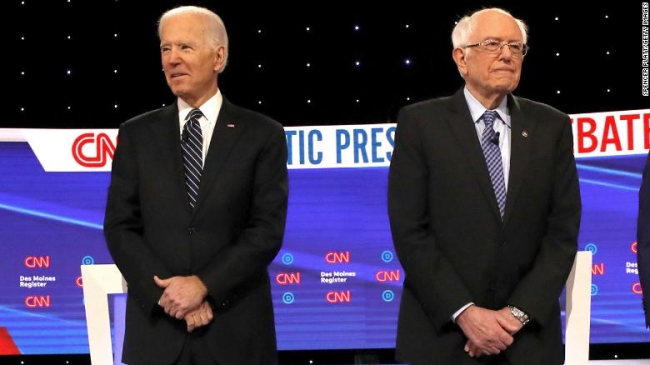You have /5 articles left.
Sign up for a free account or log in.

Joe Biden (L) and Bernie Sanders
Courtesy of CNN
In the coming weeks or days, U.S. Secretary of Education Betsy DeVos is expected to set off a firestorm of controversy by issuing a new rule to change how the nation’s colleges and universities deal with allegations of sexual assault and harassment on campuses.
Most controversially, DeVos is expected to require that the accused be able to cross-examine their accusers in a live hearing, a move opponents say would discourage victims from coming forward.
This would come after DeVos, on her own and without the consent of Congress, undid an Obama administration rule that made it easier for students to get their student debt forgiven if they were defrauded by a for-profit college. Using her administrative powers, DeVos also repealed Obama’s gainful-employment rule, which had threatened for-profits with the loss of federal funds if not enough of their graduates were able to pay off their student loans.
The pendulum could swing the other way if Democrats take the White House. Thus far, attention to Joe Biden's and Bernie Sanders’s differences on higher education policy has focused on their big-picture proposals that would require the approval of Congress, like to what extent the nation should make college free or cancel the more than $1.5 trillion in U.S. student loan debt.
(Sanders would make all public colleges and universities free and eliminate all student debt. Biden had said he would only make public community colleges free and target debt relief to lower-paid borrowers. On Sunday, however, Biden proposed making all public four-year colleges free. But in contrast with Sanders' plan, only families making less than $125,000 annually would be eligible.)
But as DeVos’s actions have shown, higher education policy experts say also significant is how the Education Department under a Biden or Sanders administration would wield power to enact policies on its own.
DeVos, like one of her counterparts during the Obama administration, Arne Duncan, illustrates the importance of the “ideology of the education secretary,” said Steve Gunderson, president and CEO of Career Education Colleges and Universities, which represents for-profits.
The question is particularly important “especially when Congress is in inaction,” said Wesley Whistle, senior education adviser for policy and strategy at the left-of-center think tank New America.
Return to Obama Policies
What Biden would do is clearer, education experts said. His higher education plan goes into far more detail than the one released by Sanders, about specific policies as well as how he’d use administrative power. Sanders’s plan, in fact, says nothing about how he’d deal with controversial issues involving for-profits.
Take, for example, the Obama administration’s borrower-defense rule and its approach to students who experience situations like the collapse of Corinthian Colleges. The for-profit college chain was found by the department to have inflated its job-placement rates to attract students -- even paying companies to hire students for a couple of days and subsequently reporting that those students found a job.
The Obama administration made it easier for defrauded students to have their federal loans forgiven. But DeVos replaced it with her own rule, adding more legal obstacles for the borrowers to get relief. Biden said in his plan that he'd bring back Obama's old rule.
“My sense is that a Biden administration would look very similar to the Obama administration in terms of the higher education regulatory agenda,” said Mark Huelsman, associate director of policy and research at Demos, a liberal think tank (and an occasional columnist for Inside Higher Ed).
Further, Biden has said he’d “require for-profits to first prove their value to the U.S. Department of Education before gaining eligibility for federal aid.”
The question is whether Biden would also require nonprofit institutions to also “prove their value,” Gunderson said. “That could be really good or really bad,” he said, depending on the details.
Gunderson’s group has said it does not oppose ineffective for-profits being held accountable, as long as other institutions are held to the same standard. He applauded, for example, DeVos’s repeal last July of Obama’s gainful-employment rule, which had mainly targeted for-profits.
But Whistle said Biden’s proposal is likely bad news for the for-profit sector. “It sounds like a hint at restoring gainful employment, or maybe he has a different idea,” he said.
Biden, in his higher education plan, appears to be ready to take aim at for-profits.
“These for-profit programs are often predatory -- devoted to high-pressure and misleading recruiting practices and charging higher costs for lower quality education that leaves graduates with mountains of debt and without good job opportunities,” he said in his plan, which also called for the Consumer Financial Protection Bureau to be more aggressive in going after private lenders if they “mislead students about their options and do not provide an affordable payment plan when they’re facing financial hardship.”
“CFPB was pretty aggressive on student loans, but it’s been severely weakened during the Trump administration,” said Michael Dannenberg, director of strategic initiatives for policy at Education Reform Now!
Sanders’s Plan Less Clear
Sanders, on the other hand, has been criticized for not mentioning for-profits in his higher education plan.
“It’s just a big question mark,” Whistle said. “We just don’t know because he hasn’t made it a priority in his messaging. He might be thinking about it, but I think not including it in his plan is a mistake.”
But others like, Kyle Southern, director of higher education policy and advocacy for the Young Invincibles, an advocacy group, see the lack of detail as less of a big deal.
“All this points more to a matter of style,” he said. “Sanders’s rhetoric has been more macro level. Biden is more on the wonky and detail side.”
And despite for-profits escaping mention in Sanders's plan, the idea of a Sanders presidency still makes Gunderson nervous.
“Bernie Sanders pretty much believes the [for-profit] sector should not even exist,” he said.
But to Tamara Hiler, education policy director for the center-left think tank Third Way, the difference in approaches between Sanders and Biden is significant and suggests Biden's policies might be less likely to be tied up by legal challenges.
“Sanders’s plan is incredibly expensive and highly unrealistic in today’s Congress or the next. It’s going to be really hard for Republicans to engage in those conversations. Biden has a lot of bipartisan ideas. He has a more nuanced approach,” she said.
To Demos’s Huelsman, though, Sanders does have a plan to limit for-profits -- by funding their public competitors. Sanders’s plan calls for creating a $48 billion federal matching grant program to eliminate tuition and fees at four-year public colleges and universities, tribal colleges, community colleges, trade schools, and apprenticeship programs.
“Part of the theory of change around the Sanders plan is that by funding robust public institutions, unsavory for-profit colleges will have less room to operate,” Huelsman said.
Despite the lack of detail in his plan, Huelsman said Sanders likely would also support the restoration of Obama-era policies, like the gainful-employment rule. Huelsman noted that Sanders was among a group of six Democratic senators who wrote the Obama administration calling for the rule’s creation.
Sanders's campaign, for its part, wouldn’t detail in emails what administrative steps he’d take. Instead the campaign pointed to his record -- including the list of 104 written questions he gave DeVos during her January 2017 confirmation hearings, in which he expressed support for the gainful-employment and borrower-defense rules.
“For-profit colleges enroll only 10 percent of all students but account for nearly 30 percent of student loan borrowers, and 35 percent of all defaults,” he wrote in one question. “One of the protections put in place is the gainful employment rule … If confirmed, do you plan on keeping this regulation in place or rolling it back to enrich your billionaire friends?”
He also noted that Grand Rapids, Mich., where DeVos earned her bachelor’s degree at Calvin College, was home to a branch of the defunct Corinthian Colleges. “Do you believe that [Corinthian’s] former students should pay for what the industry admits were ‘mistakes?’”
Sanders also appears likely to want a more aggressive CFPB, signing a letter with 14 other Democratic senators in 2018 that blasted the bureau's then acting director, Mick Mulvaney. The letter came after the CFPB's student loan ombudsman resigned, saying in his resignation letter that under Mulvaney’s leadership, "the bureau has abandoned the very consumers it is tasked by Congress with protecting."
"Sanders did support those things in the Senate," said Clare McCann, New America's deputy director for federal higher education policy. "It's just not things he's laid out clearly in his plan."
it's unclear if Sanders would follow Senator Elizabeth Warren, who said before dropping out of the Democratic presidential nomination race earlier this month that she’d cancel student debt administratively.
Warren had said she would have used the department’s discretion under the Higher Education Act to wipe away loans, even when borrowers don’t meet the eligibility requirements for specific forgiveness programs.
Sanders’s campaign wouldn’t say if it would take that approach, and Huelsman wasn’t sure.
“On one hand, Sanders is somewhat of a Senate institutionalist, and all signs point to him trying to push tuition-free college and debt cancellation legislatively,” he said. “But I absolutely could see him following Senator Warren’s lead and trying to accomplish debt cancellation through some sort of settlement and compromise authority.”








